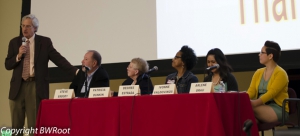Rheumatic diseases affect millions of people in the United States every year: Nearly 54 million have been diagnosed with arthritis; 1.5 million Americans have a form of lupus; fibromyalgia affects an estimated 5 million U.S. adults; and scleroderma impacts an estimated 300,000 Americans.
To learn more about these conditions and what can be done to treat them, 150 rheumatology patients and their families gathered at the recent USC Rheumatology 6th Annual Community Seminar. The April 27 event, sponsored by Amgen and Genentech and held at the Mayer Auditorium on USC’s Health Sciences campus, gave the attendees a chance to share their insights and experiences with rheumatic diseases and get information from physicians from the Keck School of Medicine of USC.
Topics for the day included:
- “Current treatments for arthritis and gout” (given by Glenn Ehresmann, associate professor of medicine at the Keck School);
- “Innate and adaptive immunity — scleroderma” and “Fibromyalgia — unraveling the mystery” (given by Daniel Arkfeld, associate professor of clinical medicine at the Keck School, and director of rheumatological education at Keck Hospital of USC);
- “Ankylosing spondylitis and psoriatic arthritis and their symptoms” (given by Stratos Christianakis, assistant professor of clinical medicine at the Keck School); and
- “Living with lupus” (given by Elizabeth Ortiz, assistant professor of clinical medicine at the Keck School).
In addition, selected rheumatology patients answered questions and told their own stories during a “Living with my disease” panel. Attendees had access to a special exhibit area during the event. Contact Paulette Pasciuti at 323-442-1757 for more information about how to participate in next year’s seminar.


